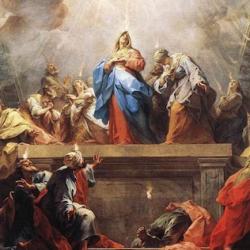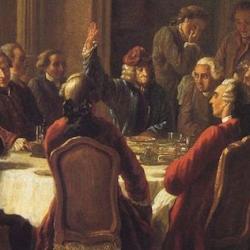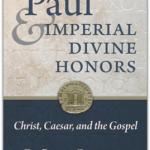Scot McKnight (A Community Called Atonement, 75-6) observes that the prophecy of Joel 2 that is fulfilled at Pentecost is a prophecy of political catastrophe. Pentecost, he concludes is both justification – “God’s act of justifying and making His judgment clear” by the gift of the Spirit that creates a community where God’s will is done – and a “judgment on the unjust rulers of this age.”
Based on Jesus’ insistence that the Spirit comes to “convict” the world (John 16), McKnight’s point is surely correct. But how does Pentecost speak judgment to the rulers of the age?
Perhaps we can tie this to a comment that McKnight makes later, in a discussion of the death of Jesus as a new Passover: At the Last Supper Jesus says that His disciples “by ingesting his body and blood, were ‘smearing’ blood on themselves to protect themselves from the judgment of God,” and he adds that “We need to recall that Jesus had just announced . . . that judgment would shortly come to Jerusalem” (86). Perhaps Pentecost spells judgment because it somehow announces the doom against Jerusalem. That would make sense of Paul’s reference to Isaiah 28 (implicitly to Deuteronomy 28) in his discussion of tongues in 1 Corinthians 14 (v. 21). Foreign tongues are a curse to Israel; tongues spell invasion and exile.
Perhaps too we might say that the fact that the Spirit creates a community of fellowship, where the poor are cared for and where justice is done, is a standing rebuke to the rulers of this age, who promise peace and justice but never achieve it. The very existence of a Spirit-filled church, one that dances in step with the Spirit, is a judgment against all human attempts to create community.















